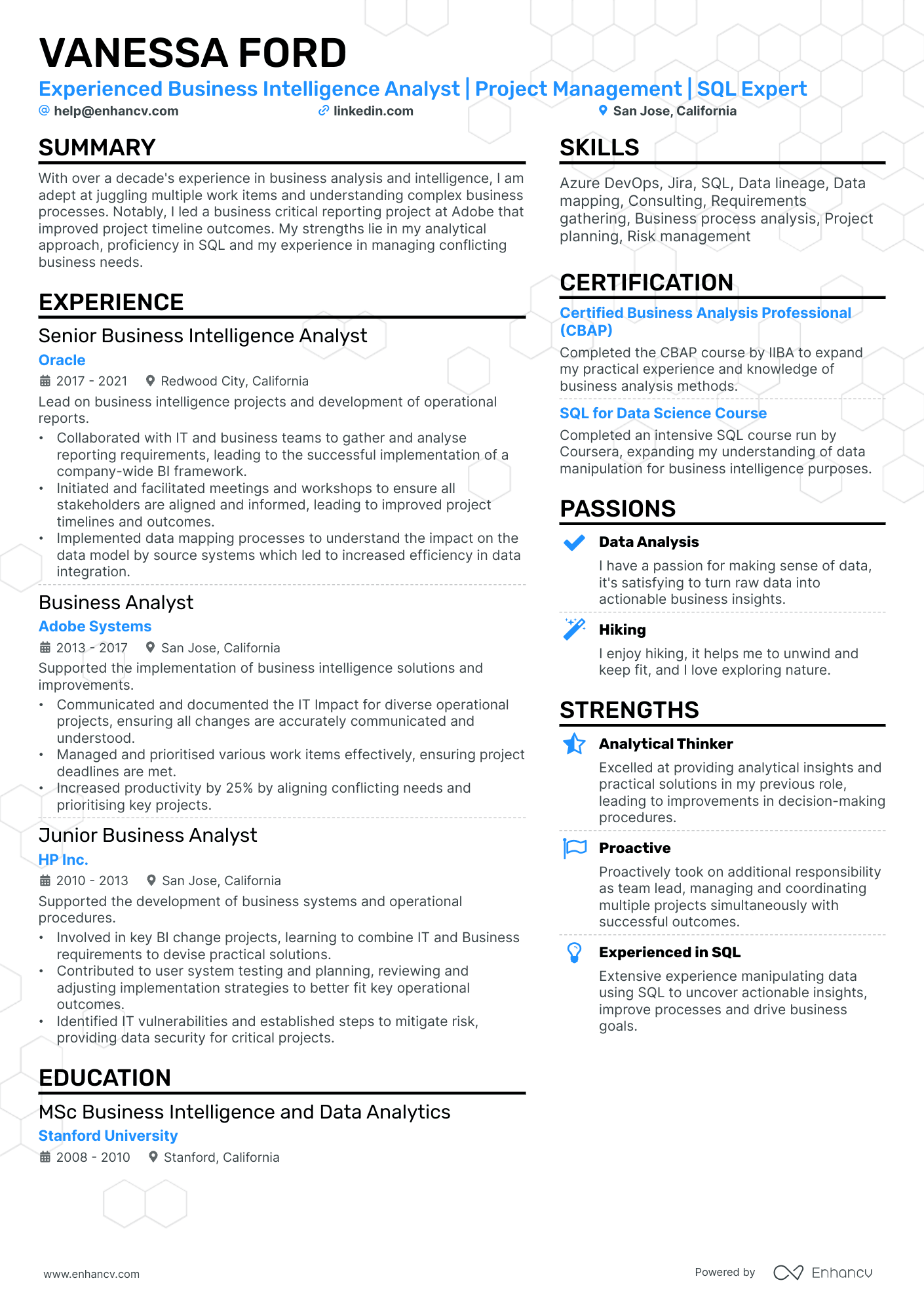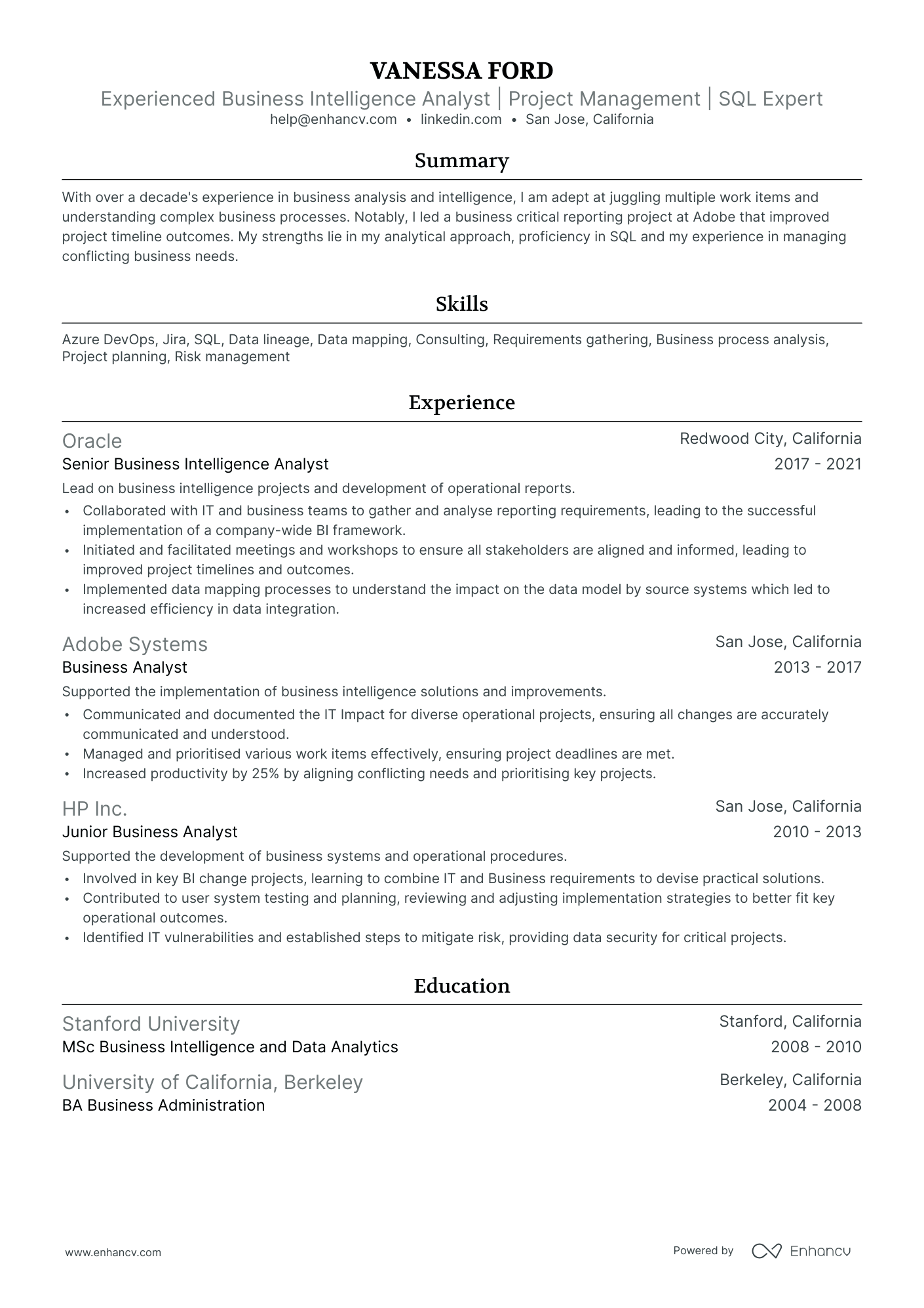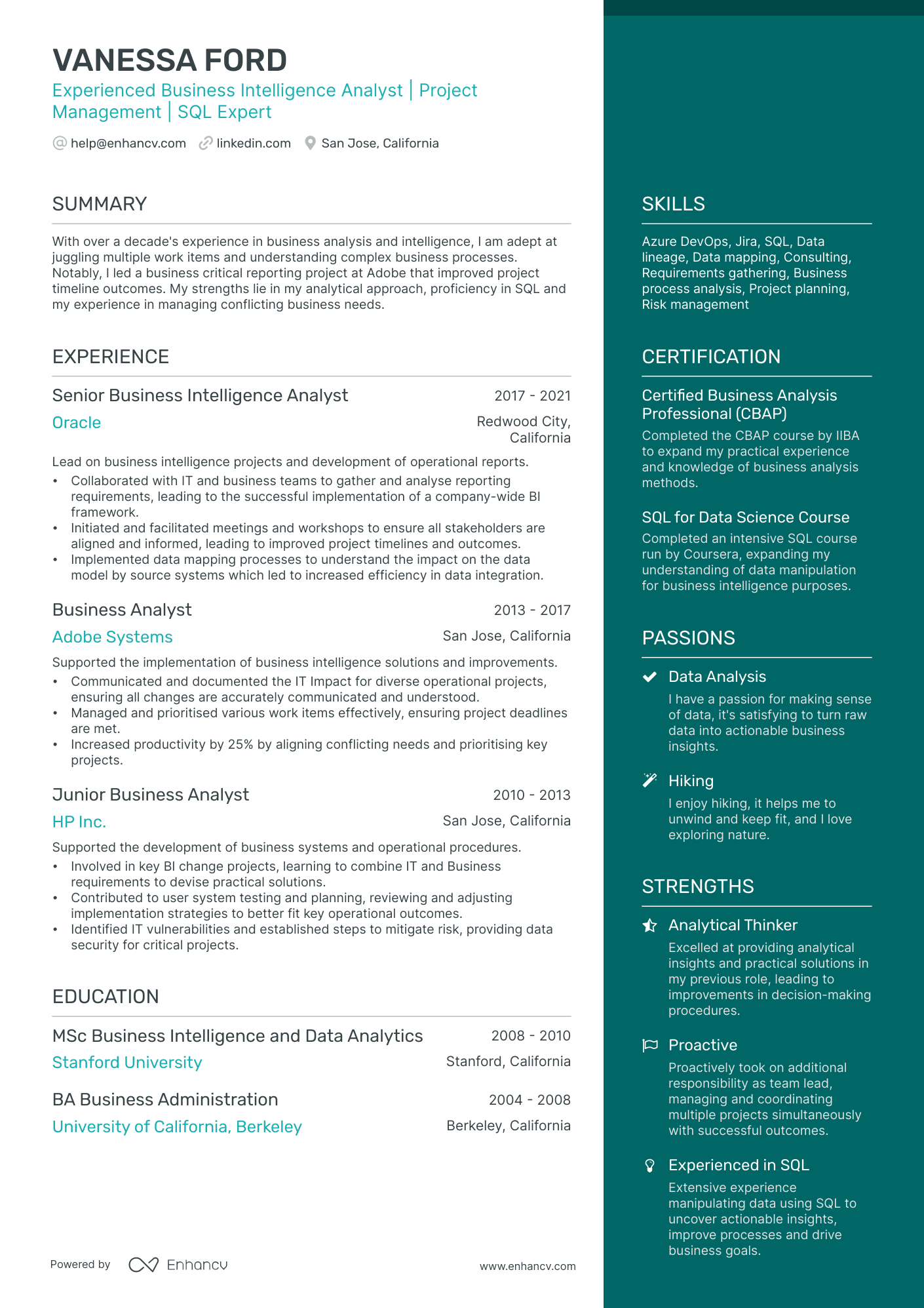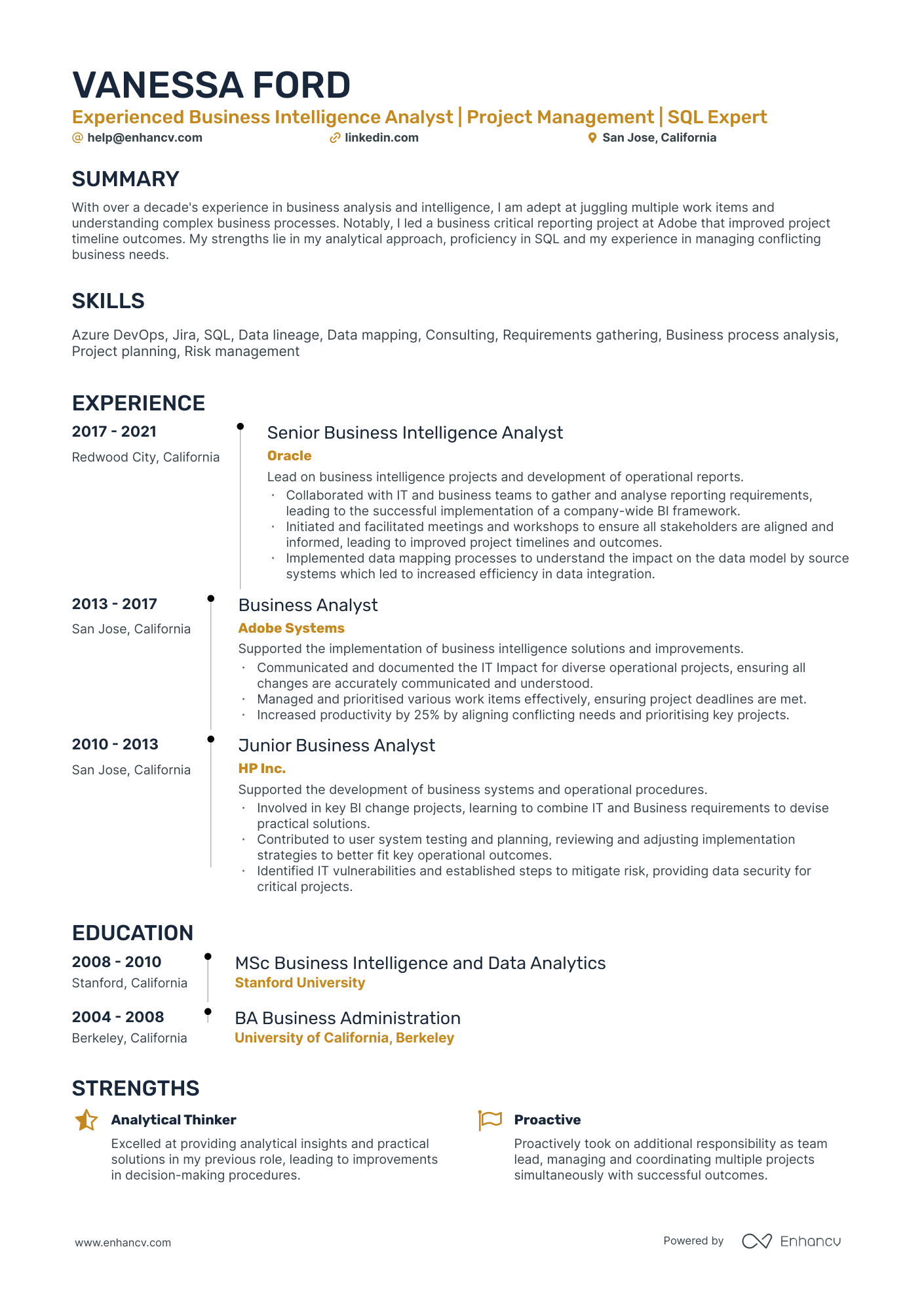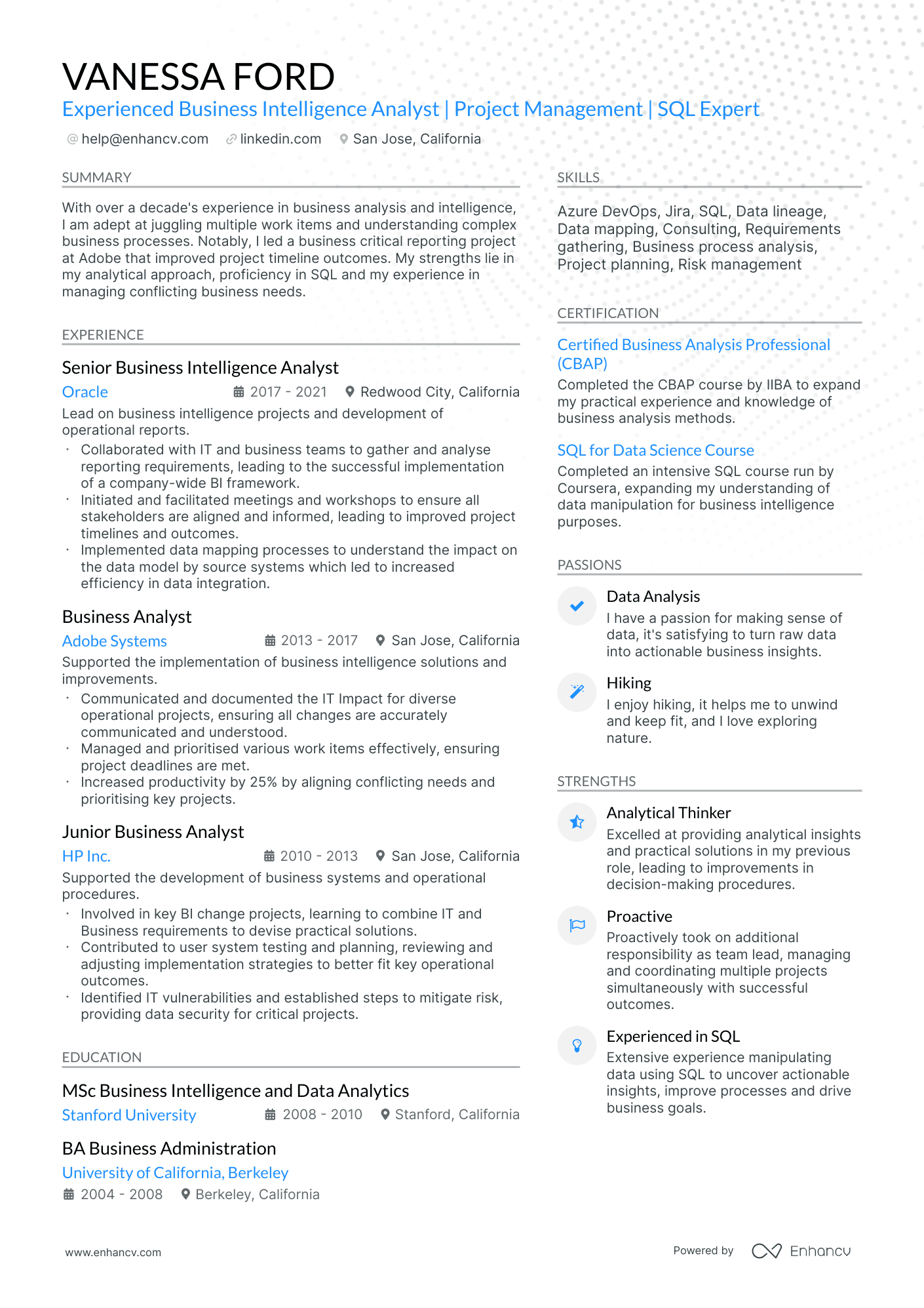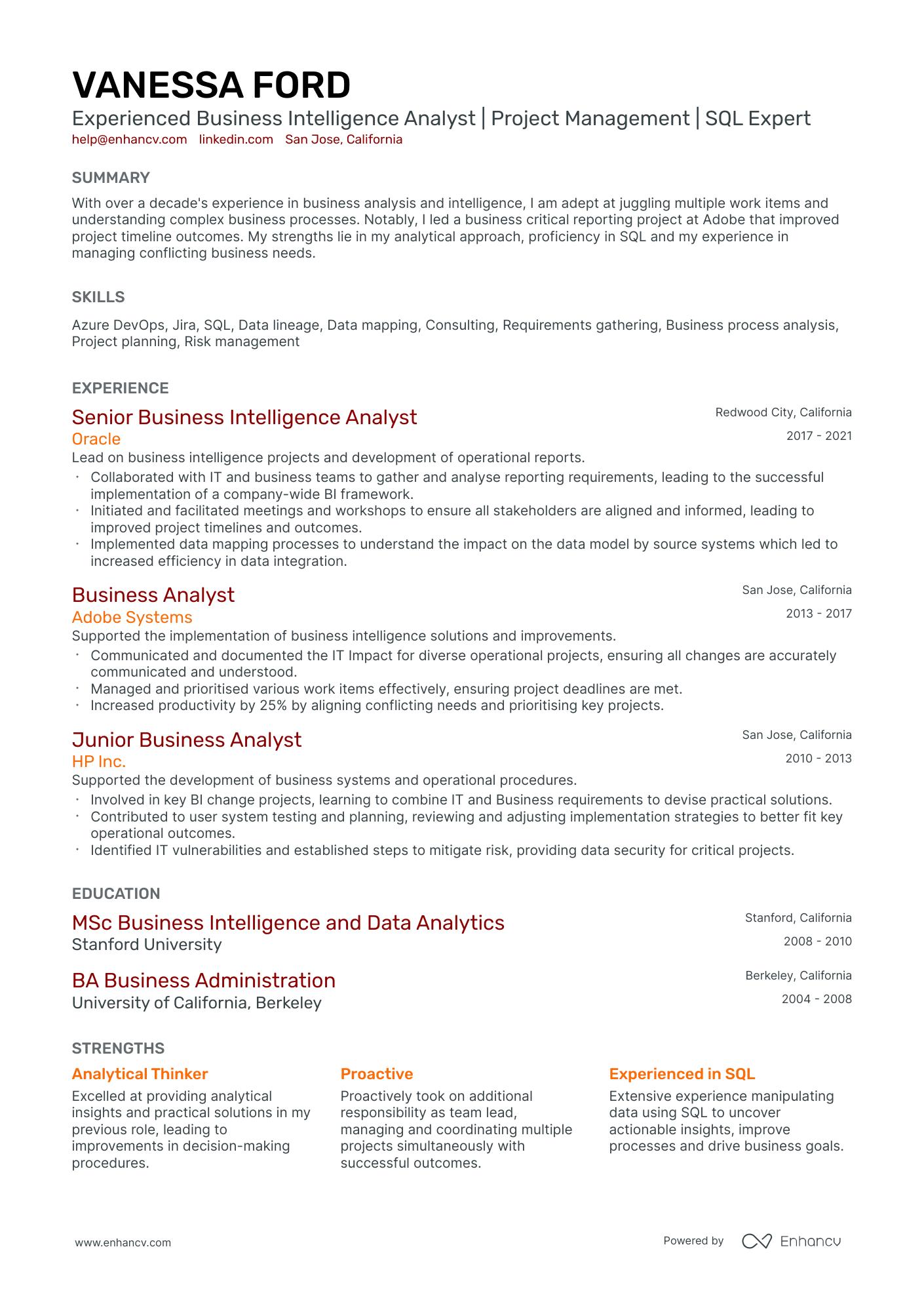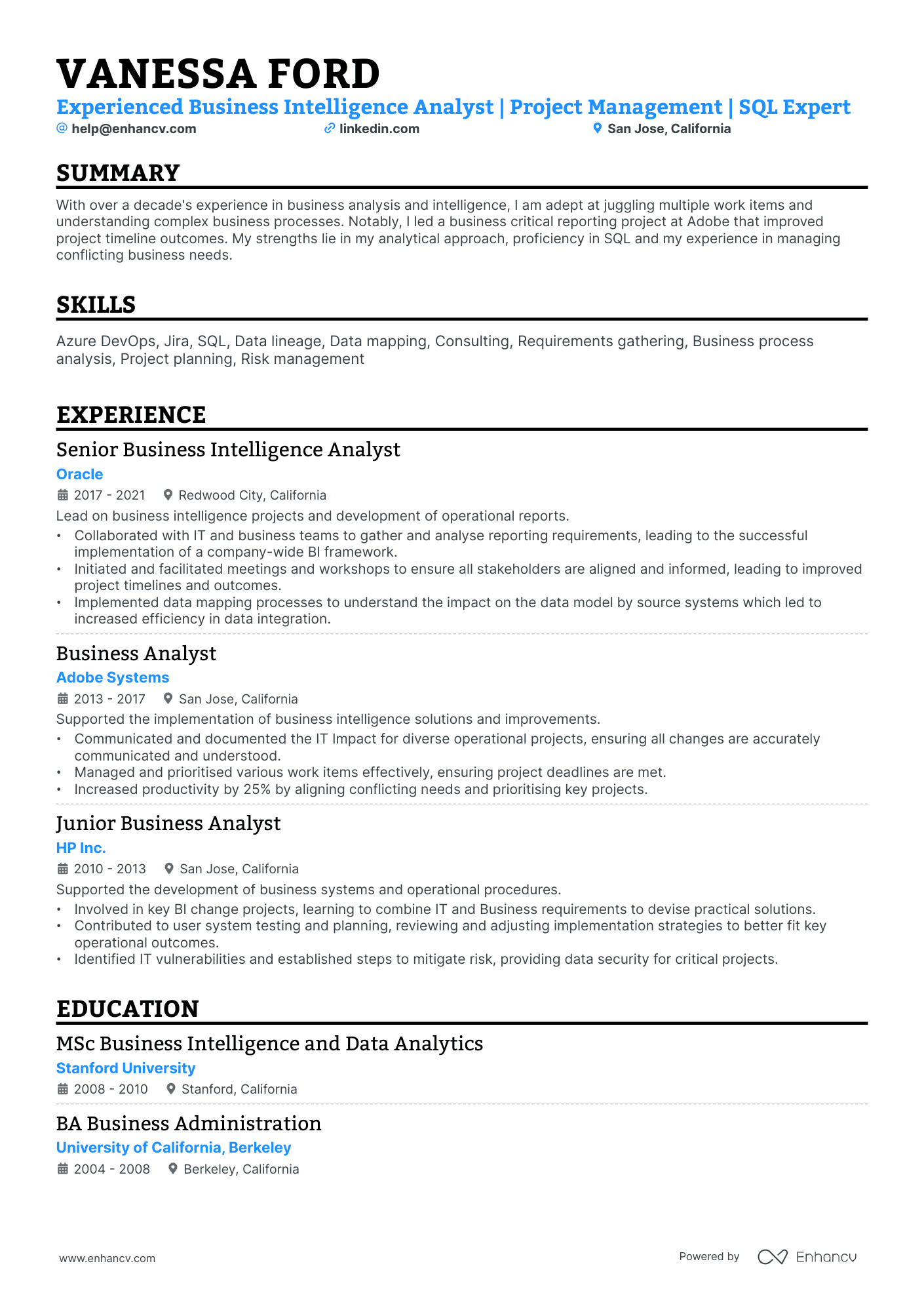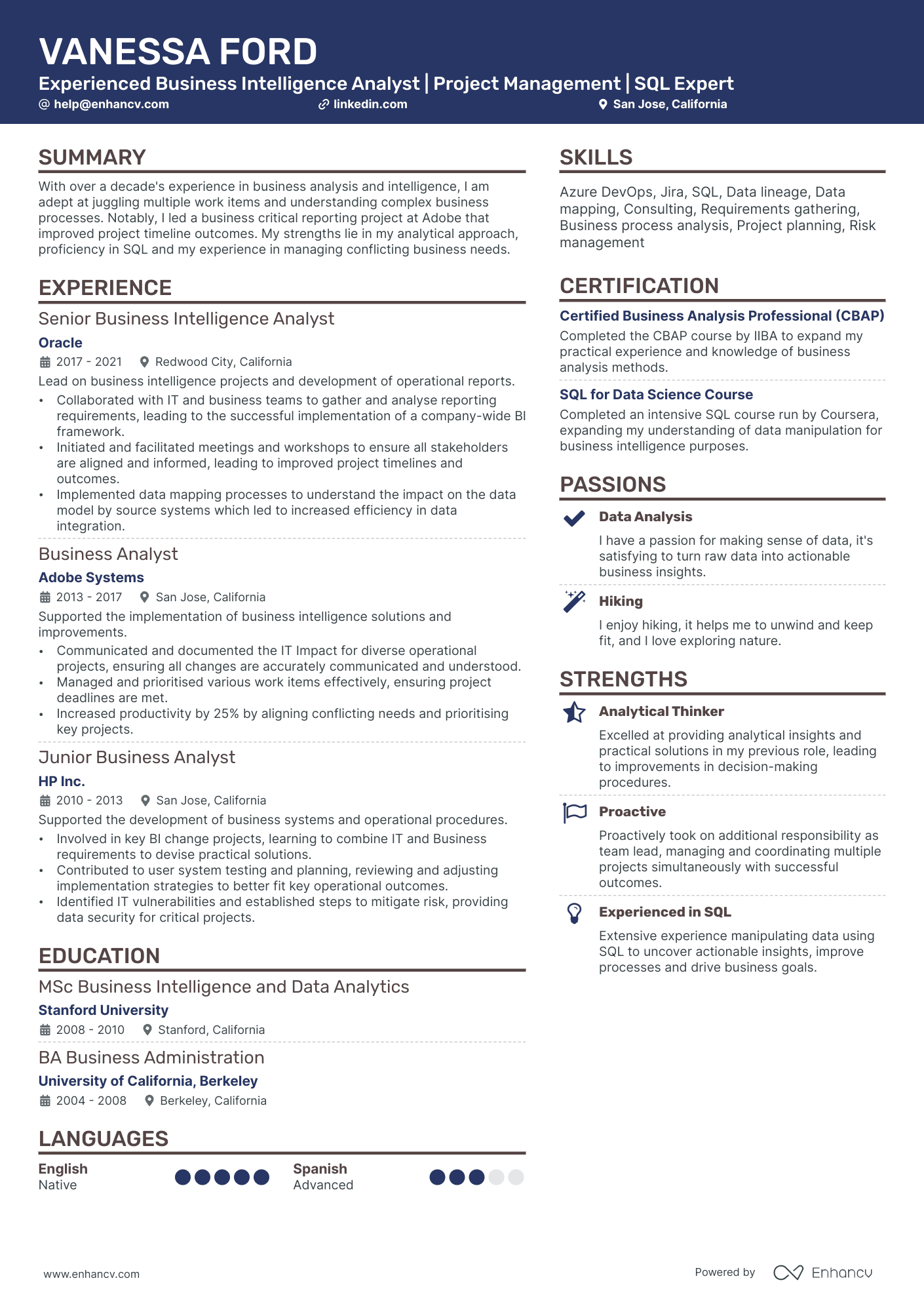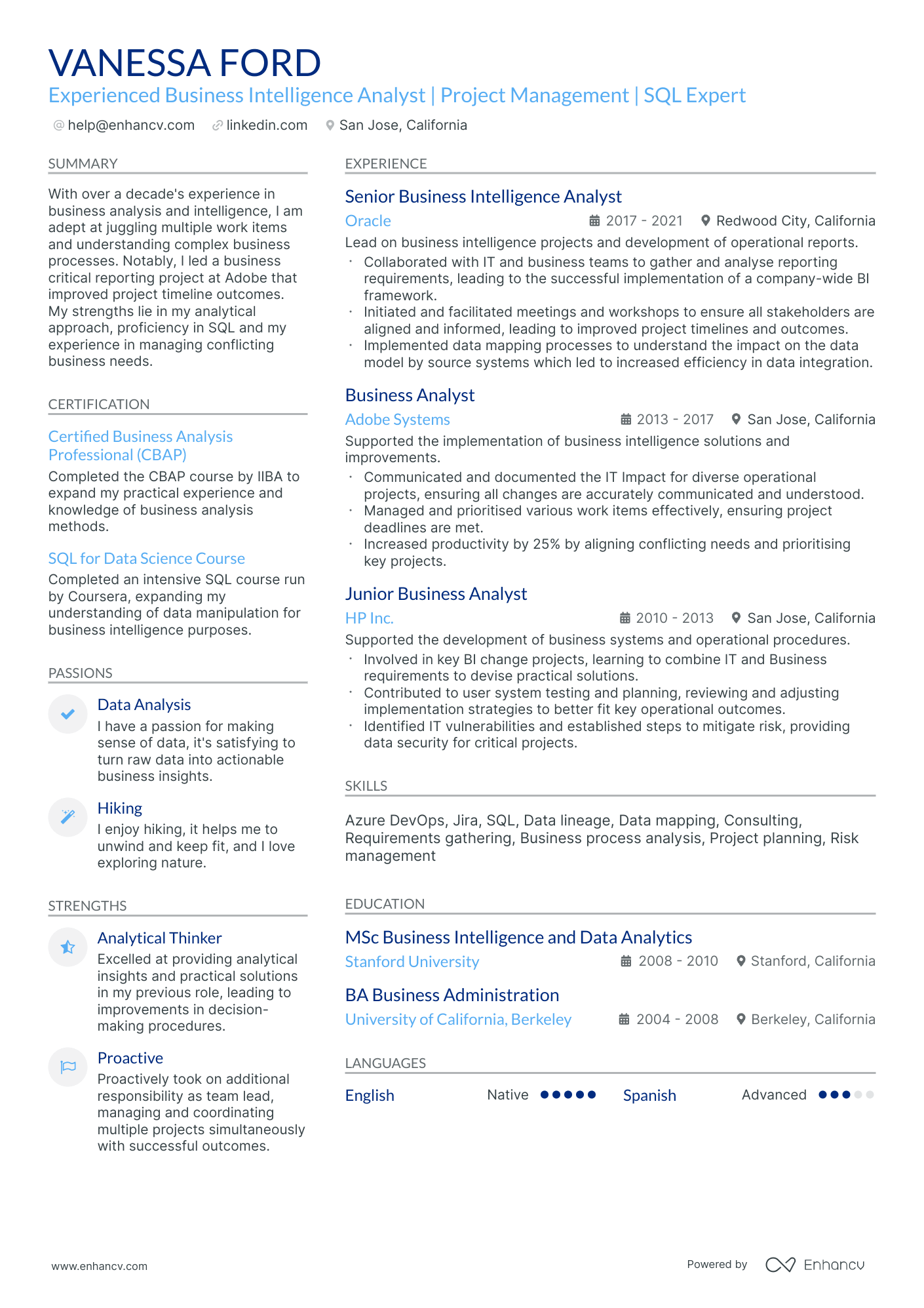A primary challenge for a business intelligence analyst when crafting their resume is effectively communicating complex data analysis skills and projects in a concise, non-technical language. Our guide can assist by providing tips and templates on how to present these technical details in an understandable and compelling manner, highlighting your critical thinking skills and ability to transform raw data into actionable business strategies.
Dive into our comprehensive guide to crafting a standout business intelligence analyst resume:
- Discover business intelligence analyst resume samples that have secured positions at top-tier companies.
- Master the aesthetics of your resume layout for maximum impact.
- Strategically present your achievements and skills across various resume sections.
- Convey to recruiters why you're the perfect fit for the job.
Recommended reads:
Simple guide to your business intelligence analyst resume format
Successful business intelligence analyst resumes all have something in common - candidates invest in a simple resume layout . One that is easy to read, makes a good first impression, and is adapted to their professional experience.
There are three distinct resume formats , which help you focus on different aspects of your resume. Those are:
- A reverse-chronological resume format - puts your most recent experience in the spotlight
- A functional skill-based resume format that makes your transferrable skills the center of attention
- A hybrid resume format - it combines skills and experiences.
What's more, keep in mind that your resume usually goes through an ATS (Applicant Tracker System) (i.e. the software used by companies in the hiring process).
The business intelligence analyst resumes that suit the ATS:
- incorporate exact match keywords and skills from the job description;
- should be no longer than two pages;
- should be submitted in a PDF format, unless specified otherwise.
Upload your resume
Drop your resume here or choose a file. PDF & DOCX only. Max 2MB file size.
Pro tip
Your resume will likely be processed by an Applicant Tracking System (ATS). Ensure your header, summary, or objective incorporates essential skills required for the role.
To craft a compelling business intelligence analyst resume, focus on these sections:
- A scannable header
- A snapshot of your professional persona, showcasing soft skills, achievements, and a summary or objective
- Skills that align with the job advert
- Quantifiable achievements in your experience section
- An education and technical skills section that underscores your proficiency with specific tools or software
What recruiters want to see on your resume:
- Deep understanding and experience with Business Intelligence (BI) tools and database software, such as SQL, Power BI, Tableau etc.
- Proven expertise in data modelling techniques and managing large datasets.
- Demonstrated ability to communicate complex information effectively to non-technical stakeholders, transforming data into actionable business insights.
- Experience in designing, implementing, and driving adoption of analytics dashboards or other data visualization outputs.
- Strong problem-solving skills with a focus on improving business operations through effective use of data analysis.
Recommended reads:
Designing your business intelligence analyst resume experience to grab recruiters' attention
For the business intelligence analyst position, it's crucial to show how your expertise matches what they're looking for.
Your resume experience section can be a game-changer. Ensure you:
- Feature roles most relevant to the business intelligence analyst job you're targeting.
- Avoid diving too deep into ancient history - unless what you did a decade ago is super relevant to the business intelligence analyst role.
- Structure each bullet to first describe what you did, followed by the skills you utilized, and then the impact of your efforts.
- Quantify your achievements with numbers, possibly highlighting the broader impact on the organization.
- Emphasize transferable skills - those you've gained in past roles that could be valuable in your new role. This showcases your unique professional value.
Crafting the experience section doesn't mean detailing every job you've ever had. Check out the business intelligence analyst resume samples below to see how top professionals present their experience.
- Developed and implemented data visualization dashboards using Tableau, resulting in a 30% improvement in data analysis efficiency.
- Collaborated with cross-functional teams to identify key performance indicators (KPIs) and developed reports to track and measure business metrics.
- Conducted data mining and statistical analysis to uncover trends and patterns, providing valuable insights for strategic decision-making.
- Managed the design and implementation of an enterprise-wide data warehouse, improving data accessibility and enabling more accurate reporting.
- Created complex SQL queries to extract and manipulate large datasets, reducing data processing time by 40%.
- Collaborated with stakeholders to develop customized reports and dashboards, facilitating data-driven decision-making processes.
- Led a team of analysts in developing predictive models to forecast customer behavior, resulting in a 15% increase in customer retention rates.
- Implemented ETL processes to integrate disparate data sources, ensuring data accuracy and consistency across the organization.
- Delivered comprehensive data-driven presentations to senior management, influencing strategic business decisions.
- Collaborated with business users to gather requirements and designed data models for a business intelligence system, improving data accessibility and reporting capabilities.
- Developed automated reports using Crystal Reports, reducing report generation time by 50%.
- Performed ad-hoc analysis to identify sales trends and customer segments, contributing to targeted marketing campaigns.
- Designed and implemented a real-time data streaming pipeline using Apache Kafka, enabling instant availability of critical business insights.
- Developed machine learning models to predict customer churn, resulting in a 25% reduction in customer attrition.
- Collaborated with data engineers to optimize data storage and retrieval, resulting in a 40% improvement in query performance.
- Conducted A/B testing on website designs, leading to a 20% increase in user engagement and a 10% decrease in bounce rates.
- Performed data profiling and cleansing to ensure data accuracy and quality, enhancing the reliability of business analytics.
- Created and maintained documentation for business intelligence processes and procedures, facilitating knowledge sharing across teams.
- Developed and implemented an automated data governance framework, enhancing data quality and compliance.
- Collaborated with stakeholders to identify business requirements and translated them into actionable analytical solutions.
- Provided training and support to end-users on business intelligence tools and best practices.
- Designed and executed ETL processes using Informatica PowerCenter, ensuring accurate and timely data integration.
- Developed interactive dashboards in QlikView, enabling self-service data exploration for business users.
- Conducted data validation and reconciliation activities to maintain data integrity and consistency.
- Implemented data governance policies and procedures to ensure data privacy and compliance with regulatory standards.
- Collaborated with data scientists to develop machine learning models and algorithms for advanced analytics projects.
- Performed root cause analysis on data discrepancies and implemented corrective actions to improve data accuracy.
- Managed a team of analysts in conducting data profiling and data quality assessments, resulting in a 20% reduction in data errors.
- Developed and maintained the data warehouse architecture, ensuring scalability and optimal performance.
- Collaborated with business stakeholders to prioritize and deliver business intelligence projects within established timelines.
Quantifying impact on your resume
<ul>
Strategies for candidates with limited or no experience
Even if you're light on experience, other facets of your business intelligence analyst resume can resonate with job requirements:
- Education: Detail skills acquired that dovetail with job expectations.
- Internships & Temporary Roles: Spotlight roles that underscore your relevant expertise.
- Skills: Address both foundational and nuanced job qualifications.
- Strengths & Achievements: Illuminate the distinct value you bring, even if you're newer to the industry.
Recommended reads:
Pro tip
The wording of your experience items should be with active, power verbs, instead of adjectives. Always be specific about each item you detail, and never overuse vague buzzwords. You weren't just "organized", but rather "Enhanced internal work processes to optimize operational management by 65%".
Business intelligence analyst resume skills: showcasing both hard and soft skills
Your business intelligence analyst resume should show recruiters your range of skills. List the tools and software you use (hard skills) and how they fit into your daily tasks. But don't stop there. Share the personal traits (soft skills) you've gained from your experiences. Here's how:
- Showcase three top career achievements.
- For each achievement, mention a hard and a soft skill you used.
- Highlight unique skills that set you apart.
- Discuss how your skills improved the workplace or team culture.
Check our list for popular hard and soft skills in the industry.
Top skills for your business intelligence analyst resume:
SQL
Tableau
Power BI
Excel
Python
R
Data Warehousing
ETL Tools
Google Analytics
Data Visualization
Analytical Thinking
Problem Solving
Communication
Attention to Detail
Critical Thinking
Team Collaboration
Time Management
Adaptability
Creativity
Decision Making
Pro tip
When detailing your skills, align them with the job's requirements. Emphasize unique technical proficiencies and provide examples of your soft skills in action.
Optimizing the education and certification sections of your business intelligence analyst resume
Your education and certification sections can be game-changers on your business intelligence analyst resume, showcasing your commitment to professional growth.
For the education section:
- Highlight advanced education, noting the institution and duration.
- If you're currently studying, mention your expected graduation date.
- Exclude degrees that don't align with the job's requirements.
- If relevant, delve into your academic journey, spotlighting significant achievements.
When listing degrees and certifications:
- Feature those directly relevant to the role.
- Highlight recent and significant knowledge or certifications at the top of your resume.
- Provide essential details like the issuing institution and dates for credibility.
- Avoid listing irrelevant degrees or certifications, such as your high school diploma or unrelated specializations.
Remember, even if you're tempted to omit your education or certifications, they can offer a competitive edge, signaling a long-term commitment to the industry.
Best certifications to list on your resume
Pro tip
If you have plenty of certifications, prioritize the most relevant and industry-recognized ones. Arrange them based on their relevance to the job at hand.
Recommended reads:
Should you add a summary or objective to your business intelligence analyst resume?
Choose between:
- Resume summary to match job needs with your top wins.
- Resume objective to share your career goals.
Both should tell recruiters about your best moments. Keep them short, around five sentences. Check out our sample structures for guidance.
Resume summary and objective examples for a business intelligence analyst resume
- Detail-oriented business intelligence analyst with a solid foundation in data-driven decision-making. Possesses over 7 years of experience in manipulating, interpreting, and analyzing data to drive growth. Expertise in SQL, Python, and Tableau. Recognized for increasing operational efficiency by 20% at ABC Corporation through effective data analytics.
- Adept Financial Analyst with a track record of identifying trends, forecasting market movements, and influencing business strategy. Embarking on a transition towards a career as a business intelligence analyst. Proficient in R, PowerBI, and MS Excel and has a strong ability to translate complex data into actionable business insights.
- Seasoned Software Developer transitioning to a business intelligence analyst position. Known for coding efficiency and software enhancement. Proven skills in Python, Java, and SQL. Spearheaded the successful software revamp project boosting user satisfaction by 35% at XYZ Company. Keen to apply analytical abilities to drive business success.
- Accomplished Project Manager armed with 5 years of experience in leading cross-functional teams. Choosing a new career direction as a business intelligence analyst. Fluent in Agile methodologies, Python, and Power BI. Successfully led the delivery of a $2M project under budget and ahead of schedule at PQR Inc.
- Eager to enter the realm of data analysis as a business intelligence analyst. Highly skilled in problem-solving and quantitative reasoning from a strong academic background in Statistics. Brings proficiency in data visualization tools like Tableau and PowerBI. Aiming to apply robust data interpretation skills to uncover valuable business insights.
- Aspiring business intelligence analyst with an academic foundation in Computer Science and Mathematics. Skilled in Python, SQL, and statistical analysis. Excited to leverage technical prowess and critical thinking skills to deliver advanced data-driven solutions that support company growth strategies.
How to include other relevant sections for your business intelligence analyst resume
Apart from the standard sections listed in this guide, you have the opportunity to get creative when building your profile.
Select additional resume sections that you deem align with the role, the department, or the company culture.
Here are the ones we recommend:
- Language skills - use a profficiency framework to indicate your aptitude level;
- Hobbies and interests - you can share more about your favorite books or how you spend your time. It's great for culture alignment;
- Volunteering - helps you highlight the causes you care about and hints at people skills you gained such as teamwork, emotional intelligence, and organizational skills;
- Awards - the space for your most prominent business intelligence analyst professional accolades and achievements.
Make sure that these sections don't take too much away from your experience, but instead build up your business intelligence analyst professional profile. You can add them as a second column to your resume, or on a second page.
Key takeaways
- Your resume should be a curated narrative, highlighting your alignment with the role's requirements.
- Strategically position your skills, balancing both technical and interpersonal strengths.
- Be selective in detailing experiences, focusing on relevance and impact.
- Utilize the summary or objective to offer a snapshot of your professional essence.
- Across all sections, prioritize authenticity and clarity, ensuring your resume resonates with the business intelligence analyst role you're eyeing.
